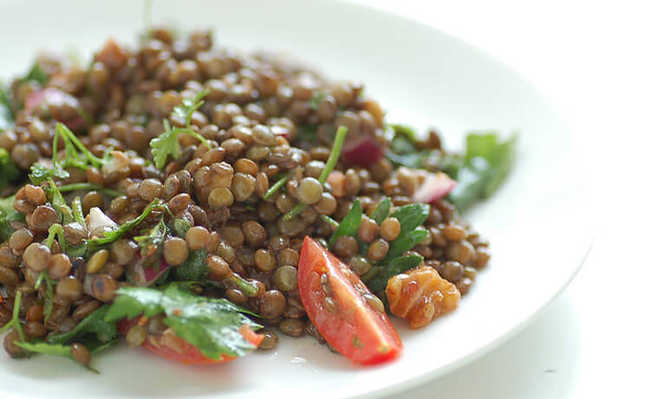Soybean meat: advantages and disadvantages
Soy protein contributes to weight loss and helps build muscle, but contains antinutrients

Edited and resized image of Creatv Eight is available on Unsplash
Soy meat, also called textured soy protein, is one of the most popular soy products. From this vegetable, are also made tofu, tempeh, milk, soy sauce and oil. Soy protein can be prepared as a barbecue, ground beef, hamburger, pot meat, sauces and stews. It is a complete source of protein, helps build muscle and lose weight, but it also contains antinutrients.
For vegetarians, vegans, flexitarians, peganos (among other philosophies of life that include avoiding the consumption of animals and their by-products), soy meat generally serves as a source of protein. However, soy is a somewhat controversial food. While some think of it as a nutritional powerhouse, others see it as an enemy of health. Understand:
- Soybeans: is it good or bad?
Nutritional information
Isolated soy protein powder is made from defatted soy flakes that have been washed with alcohol or water to remove sugars and fiber. They are dehydrated and made into powder. This product contains very little fat and no cholesterol.
Soy protein powder is used to make infant soy formula, as well as a variety of meat and dairy alternatives.
Every 28 grams of soy protein isolate powder contains:
- Calories: 95
- Fat: 1 gram
- Carbohydrates: 2 grams
- Fiber: 1.6 grams
- Protein: 23 grams
- Iron: 25% of the Recommended Daily Intake (IDR)
- Phosphorus: 22% of the IDR
- Copper: 22% of the IDR
- Manganese: 21% of the IDR
Although it is a concentrated source of protein, soy protein isolate powder also contains phytates, which can decrease mineral absorption.
Helps build muscle
Soy protein is a complete protein, meaning it contains all the essential amino acids that the body cannot produce and needs to get from food.
While each amino acid plays a role in muscle protein synthesis, branched chain amino acids are the most important when it comes to building muscle (2, 3).
One study showed that people who ingested 5.6 grams of branched-chain amino acids after resistance training had a 22% greater increase in muscle protein synthesis than those who received a placebo. Specifically, leucine activates a specific pathway that promotes muscle protein synthesis and helps build muscle (5, 6).
Compared to whey and casein proteins, soy protein is somewhere in between when it comes to muscle protein synthesis.
Another study showed that soy was inferior to whey protein in terms of protein synthesis for muscles, but performed better than casein. The researchers concluded that this could be due to digestion rate or leucine content (7).
Can help with weight loss
Studies indicate that high protein diets can result in weight loss even without limiting calories or nutrients (10, 11, 12). However, evidence is mixed on the relationship between soy protein and weight loss.
In one study, 20 obese men participated in a high-protein soy-based diet as well as a high-protein meat-based diet.
Appetite control and weight loss were similar in both groups. The researchers concluded that high protein soy-based diets are effective for weight loss.
Another 12-week weight loss study found similar results with powdered soy protein. Participants received soy-based or non-soy-based meal replacements. Both resulted in an average weight loss of 7.8 kg by the end of the study.
In addition, a study in people with diabetes and obesity showed that soy protein meal replacements, such as shakes, may be superior to standard weight loss diets (15).
Those who consumed the soy protein meal replacement lost an average of 2.4 kg more than those who followed standard diets.
However, while some studies look at the benefits of weight loss, a review of 40 studies evaluating the effect of soy protein on weight, waist circumference and fat mass found no significant positive effects.
health benefits
Some research suggests that adding soy meat to your diet can provide a variety of health benefits. Soy-based foods appear to have positive effects on heart health. In a review of 35 studies, soy consumption reduced “bad” LDL cholesterol and increased “good” HDL cholesterol.
Another review showed that replacing animal protein with 25 grams or more of soy protein resulted in lower total cholesterol, “bad” LDL cholesterol, and triglyceride levels.
As far as cancer is concerned, the evidence seems mixed. Many observational studies have observed a protective effect of a diet rich in soy.
However, they note that it remains unknown whether this applies to soy protein isolate powder or to other textured vegetable proteins made from soy.
Some observational and case-controlled studies link soy intake to a reduced risk of breast cancer (21, 22, 23).
Others, however, do not show protective benefits of consuming soy for this type of cancer. One study even linked soy intake to stimulated rapid cell production in the breasts of premenopausal women, possibly increasing the potential risk of breast cancer (24, 25).
When discussing the role of soy in men's health, some observational studies indicate that consumption of soy-based foods may reduce the risk of prostate cancer in older men (26, 27).
While the results of observational studies are encouraging, clinical trials in humans on the potential protective effects of soy cancer are inconclusive at this time.
Soy protein can serve as a good source of plant-based protein for people who do not consume animal proteins, including vegetarians and vegans, allowing them to reap the important benefits of this nutrient (20).
It is safer to store, cheaper and has less pesticides than animal meat
possible disadvantages
Some people have concerns about soy. As mentioned, soy protein contains phytic acid, also known as an antinutrient. This reduces the availability of iron and zinc in soy protein (28, 29).
However, phytates do not adversely affect health unless your diet is severely unbalanced and you rely on soy meat as a source of iron and zinc.
There is also concern that soy consumption could affect a person's thyroid function. Soy isoflavones function as goitrogens that can interfere with thyroid function and hormone production (30, 31). However, there are several studies showing that soy has no or very slight effect on thyroid function in humans (32, 33, 34).
- Hyperthyroidism and hypothyroidism: what's the difference?
In addition, many people avoid protein or soy meat because of their phytoestrogen content, as they fear that phytoestrogens can harm the body's natural hormone levels.
Phytoestrogens are chemical compounds that occur naturally in plants and have estrogen-like properties that bind to estrogen receptors in the body. Soy is a notable source of them (35).
However, soy protein powder is made from soy washed in alcohol and water, which removes much of the phytoestrogen content (35, 36).
Likewise, many men fear that soy protein could lower their testosterone levels, but science doesn't support that claim.
A review of studies indicated that neither soy-based foods nor soy isoflavone supplements alter testosterone measurements in men (37).
It has less pesticides than animal meat, in addition to being easier to store and cheaper
A significant part of soy is transgenic, this characteristic makes this plant resistant to herbicides, such as the pesticide glyphosate. Therefore, a common concern of people who decide to reduce the consumption of animal meat is the pesticides used in vegetables such as soybeans. However, animal meat may contain more pesticides than soy meat. This is because a large part of the slaughtered cattle is fed on soy or corn feed grown with the use of pesticides, and these products have a fat-soluble characteristic that makes them bioaccumulate in the fatty parts of the animal, concentrating in greater amounts throughout the life. An analysis showed that the presence of pesticides in the breast milk of omnivorous women is greater in relation to vegetarians.
In addition, dehydrated soy meat does not need to be refrigerated, has a long shelf life and costs less than animal meat. When hydrated for your preparation, it yields more.
Text originally written by Amy Goodson for Healthline and adapted by Stella Legnaioli










